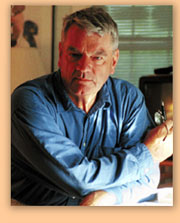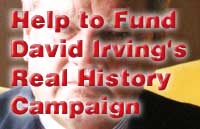|

IN
HIS WORDS of introduction, Victoria barrister Mr Douglas
Christie remarked that historical research may in some
cases lead to unpopular conclusions. "We know that those
unpopular conclusions can cost a great deal to anyone who
relies upon the media of communication for their livelihood,
as does every historian, in effect." He then read the
dedication on the plaque which they were about to present to
their guest, Mr Irving:
|
DAVID IRVING: I must admit to having had a certain sense of dismay upon
opening this Federal Express package. I was on the point of
coming to Canada. I had spent five months planning this tour
because, of course, when you prepare a tour of this
magnitude, you don't do it overnight: I began the planning
five months ago; I sent boxes of books of materials out
around the world. This particular tour, as you can see from
my poster here, swings across Germany, France, Belgium, the
United States, Canada, Australia, New Zealand, and South
Africa. It spans the entire globe. The Planning goes on
month after month, because it is an International Campaign
for Real History, one which I have been waging now for two
years. |
Now, what kind of country is this, where a Minister of
the Crown, here in Canada, takes advice from aliens
in another country upon whom his countrymen can invite
to lecture them in a private meeting like this? This is what
I ask myself. THE "criminal offence" which I have allegedly
committed is however not an offence anywhere in the world
except Germany. In Germany this year I was fined for
uttering an opinion -- a sincerely held opinion, an opinion,
I would venture to add, which I hold as an expert historian
on the Third Reich; I have spent thirty years now working in
the archives in London, in Washington, in Moscow -- in
short, around the world. If I express an opinion it's
probably a reasonably accurate opinion which I have arrived
at, over a period of years, and without fear or favour to
either side, and certainly not as a result of being bribed,
or corrupted, or intimidated. |
I was not changing my mind. Why should I? Nothing that
that judge had said was calculated to make me change my
mind: He had refused to hear the witnesses; he had refused
to allow our evidence. When the hearing came to an end, in
that packed courtroom in Munich, I delivered a speech to the
judge Herr Stelzner, the closing speech to which I was
entitled before he handed down his verdict (I have a
tape-recording of it here.) I said to the judge, I know what
you are about to do: You are going to find me guilty because
you have to -- because German law says you have to
find me guilty, guilty of "defaming the memory of the dead".
(This is in itself an artificial device, because I hadn't
defamed any dead people, I had just stated an opinion. The
specific statement was, "In my opinion the gas chamber which
they show to the tourists, the gas chamber at Auschwitz
which they show to the tourists, is a dummy built by the
Poles after the war". You may think this is an outrageous
statement, and you are entitled to your opinion. It happens
to be a true statement. The
Poles themselves admit it*, which makes it even more
ironic -- that I was fined that colossal sum for expressing
an opinion that was a true opinion.) |
my job, or my pension, or my future. YET I MUST admit a certain sense of sadness for this my
beloved country, Canada. |
rightly served twenty years of a life sentence for
planning a bloody insurrection and confecting two hundred
and fifty thousand land mines and hand-grenades with which
he was hoping to kill tens of thousands of his fellow
countrymen (the Blacks, not the Whites, of course -- the
Blacks were the ones who were going to die). WHAT I AM talking about this evening is freedom of
speech. I am not going to lecture to you on the reasons why
I have fallen foul of the Simon Wiesenthal Centre. I am not
going to talk about the Holocaust; for me as a historian the
Holocaust is a mere footnote to history. I write about world
history; I write about Real History, and I am not going to
talk at any great length about something which is far more
obsessive interest to other historians, revisionists, or
whatever. |
paid them, now told him: "Piss off, little man! We don't
need you any more, and as for paying out, we are not going
to! You are a little man and we are a gigantic multinational
company, and we don't deal with people like you." |
-- a letter from H.W. Wicks! And so it went on, at
intervals of three and five years: in the archives, oh boy,
another letter from Wicks! In the Schriftguverwaltung of
Heinrich Himmler, the private archives of the
Reichführer of the S.S. -- a letter from H.W. Wicks,
complaining about THIS PARTICULAR FIGHT which I am conducting now, this
International Campaign for Real History, has become uglier
and uglier as the "war" has gone on. |
comment?" WHEN BILL DUNPHY of the Toronto Sun telephoned
this evening and accidentally found himself connected to me
-- he has been trying to get me for fifteen days to get an
interview on this whole business -- he said, "You are David
Irving, aren't you!" I replied, "I am not going to comment
on that." He said, "Well, I want to interview you."
|
I did a deal with the Sunday Times in London, the
most prestigious English newspaper. |
been published by Viking Press in the United States, it
had been published by Macmillan's in Britain, it had been
republished by Macmillan's in Britain, it is being published
around the world -- but it was such a successful book that I
decided to publish a super deluxe edition of the book in my
own publishing house, which I would then set up so that when
pressure was put on my other publishers to "dump Irving" I
would have a lifeboat. NO, THEY WERE trying to destroy the prospects of my new
publishing |
company, and so they were going round smashing the
windows of every bookshop that was stocking the book. Here
is one typical report: A Nottingham bookshop has withdrawn a book by David Irving after its front window was shattered by a brick last weekend. A spokesman from Waterstone & Company said that local Jewish and anti-racist are complaining about the sale of Mr Irving's book "Hitler's War". "We have acute problems in Nottingham, and because of the strong opposition to the book, we have decided it was appropriate and prudent to withdraw it." No one is claiming responsibility for the attack. However, the spokesman emphasised the book was still available on request. |
floor: "What have you come for?" VERY WELL, WE are not going to let you into Rome this
time anyway. We have been requested not to let you in." IF THERE IS an arrest warrant in Austria, it's because I
expressed an opinion again. THE PROTECTION IS gradually melting away. These frantic
steps that we see them taking now -- you wonder why suddenly
your Canadian Government is trying to ban historians from
visiting Canada; you wonder why they are taking these
extraordinary steps around the world to prevent me and other
people from speaking. |
The hall, it shortly turned out, had been quietly surrounded by police. A few minutes later while he answered questions from the audience, six officers of the Royal Canadian Mounted Police invaded the room, arrested Mr Irving, and took him away in handcuffs to Victoria City Jail. |

